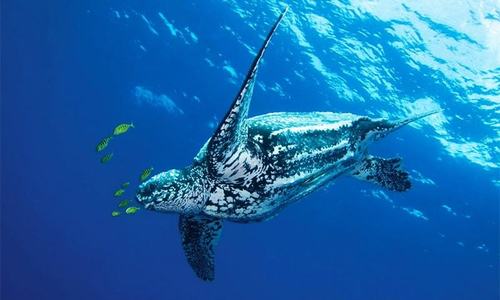Sea turtles along Pakistan’s coast are facing many anthropogenic threats, including habitat degradation, plastic pollution, and entanglement in fishing gears, according to the World Wildlife Fund (WWF).
As a result of the construction of huts along beaches in Karachi and Balochistan, major nesting grounds of sea turtles are adversely affected, the study said on the eve of World Sea Turtle Day.
Since 2000, World Sea Turtle Day is observed every year on June 16 to raise awareness about the dwindling population of sea turtles and their diminishing habitat.
According to Muhammad Moazzam Khan, the technical adviser to WWF-Pakistan, plastic waste, collapsing huts, and rubble pose a serious threat to nesting females and juveniles along the coastal areas.
Sea turtles are known to nest on a number of local beaches, including Sandspit, Hawke's Bay, and Cape Monz along the Sindh coast, as well as Taq (Ormara), Astola Island, Gwadar Headland, and Daran along the Balochistan coast.
Thousands of female turtles visit these beaches to nest and lay eggs.
Read more: Wherever I lay my eggs is home
To collect data on the entanglement of turtles, the WWF-Pakistan initiated a study in 2012, which revealed that 30,000 sea turtles were annually caught in tuna gillnet fisheries of the country.
This included roughly 25,500 Olive Ridley and 4,500 Green turtles in the offshore waters.
Entanglement in fishing nets is the most serious threat to marine turtles.
It was estimated that about three per cent of entangled turtles were dying due to drowning or mishandling onboard fishing vessels.
Protecting endangered species
To protect the endangered species, the organisation has trained some 100 "skippers and crew members" to safely release the entangled sea turtles and developed a modification in the operation of the gillnets.
This, the study said, has reduced the entanglement of sea turtles by 85pc.
Pollution is also another major threat to the sea turtle population. Popular beaches are littered with garbage, dominated by single-use and micro-plastics.
The study has also reported on the impact of diesel and petrol on the population of turtles, stating that exposure to these fuels results in deformation in hatchlings and poses a serious threat to their survival.
Government agencies have taken several steps in recent years for the protection of sea turtles along the coasts.
"Through the efforts of WWF-Pakistan, fisheries-related legislations of both maritime provinces have been amended and sea turtles, as well as freshwater turtles, are declared protected," the study added.
According to Khan, the declaration of Astola Island as a marine protected area, actions taken by the wildlife departments of Sindh and Balochistan, as well as awareness programmes initiated by non-governmental wildlife organisations, have collectively increased the turtle population along the coastal regions.
However, he added that there is a need to declare all turtle beaches along the coast of Sindh and Balochistan as marine protected areas.
Rab Nawaz, the senior director of WWF-Pakistan's Conservation Biodiversity, for his part, called for "better protection and conservation" of sea turtles in the country.
He said these unique and iconic animals have been in existence for more than 100 million years but are under "serious" threat.
Human activities such as the destruction of nesting sites and unplanned development, as well as climate change, are pushing turtles closer to extinction, which calls for immediate steps for their conservation, he stressed.
Major species
Experts believe that Pakistan has lost 25-30pc of the nesting ground for Green turtles over the past decade.
Female turtles lay their eggs on beaches between October and February, and the eggs hatch in about 60 days.
Five species of marine turtles are reported from Pakistan, with Green turtles (Chelonia mydas) the most dominant one, while another important sea turtle is the Olive Ridley (Lepidochelys olivacea) which used to nest along the coast.
However, no nest of this turtle species has been reported since 2001, the study said.
The other three species, including Loggerhead turtle (Caretta caretta), Hawksbill turtle (Eretmochelys imbricata), and Leatherback turtle (Dermochelys coriacea) are reported from Pakistan and only a few authentic records are made by WWF-Pakistan.
Although turtles are not commercially harvested for food in Pakistan, however, poaching of turtle eggs has been reported.
Turtle hatchlings are also illegally removed from their nests and sold in aquarium shops.
"Although the government takes action against poachers, this illegal trade still continues and needs to be curbed," it concluded.














































